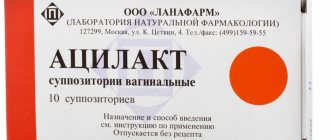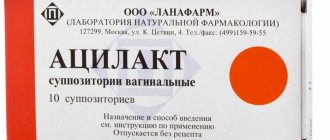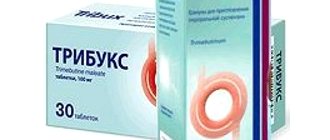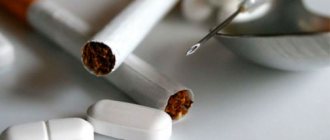Acylact, tablets, 30 pcs.
Description of the active substance (INN):
Lactobacilli acidophilus
Pharmacological action:
Live lactobacilli included in the drug have antagonistic activity against a wide range of pathogenic and opportunistic bacteria (including staphylococci, Proteus, enteropathogenic Escherichia coli), normalize the digestive activity of the gastrointestinal tract, improve metabolic processes, and help restore natural immunity.
They metabolize glycogen in the vaginal epithelium to lactic acid, which maintains the vaginal pH at 3.8-4.2. Lactic acid in high concentration creates unfavorable conditions for the life of acid-sensitive pathogenic and opportunistic bacteria. Indications:
Dysbacteriosis of the gastrointestinal tract of various etiologies (including in children, starting from the first day of life), diseases of the oral cavity;
dysbiosis of the urogenital tract, incl. for inflammatory diseases of the genitourinary tract of infectious and non-infectious nature - gonorrhea, urogenital chlamydia, urogenital herpes, bacterial vaginosis (gardnerellosis), hormone-dependent colpitis (senile, etc.); preparation for planned gynecological operations (to prevent postoperative infectious complications); prenatal preparation of pregnant women at risk for inflammatory diseases (for the prevention and treatment of vaginal dysbiosis). Contraindications:
Hypersensitivity, candidiasis, childhood (tablets).
Side effects:
Allergic reactions.
Directions for use and dosage:
The drug contains in 1 dose at least 10 million live acidophilic lactobacilli.
A tablet or suppository contains 1 dose of the drug. Oral dosage forms - orally, 30-40 minutes before meals 2-3 times a day. For acute inflammatory processes, infants - 2-3 doses, older children and adults - 5 doses for 7-8 days; for prolonged and recurrent forms of the disease, infants - 2-3 doses, older children and adults - 5 doses for 14-25 days. For diseases of the oral mucosa - 4-6 doses by resorption (in tablets) or 5 doses in the form of irrigation (solution) 2-3 times a day for 14-15 days. Intravaginally - in the form of irrigations, applications and suppositories. For inflammatory processes of the urogenital tract - 5 doses (in the form of a solution) or 1 dose (1 suppository) 2 times a day for 5-10 days. In case of violation of the purity of vaginal secretions in pregnant women up to III-IV stage. - 1 suppository 1-2 times a day for 5-10 days or more, until clinical symptoms disappear and the purity of vaginal secretion is restored to grade I-II. In order to prevent purulent-septic complications, use 1 suppository 1-2 times a day for 5-10 days (before the proposed operation or delivery). Rehabilitation therapy after the use of antibiotics - 1 suppository 1-2 times a day for 10 days. The course is repeated for 3-4 months with an interval of 10-20 days. Special instructions:
The use of suppositories can be combined with the simultaneous administration of antibacterial, antiviral and immunomodulatory drugs.
Suppositories that smell like rancid oil or are in damaged packaging are not suitable for use. Interaction:
Simultaneous chemotherapy and antibiotic therapy are allowed.
The description of the drug Acylact is not intended for prescribing treatment without the participation of a doctor.
ENZYME
Instructions for use of the medicinal product for medical use ACILACT lyophilisate for the preparation of a suspension for topical use and oral administration.
Trade name: Acylact;
International nonproprietary name: Lactobacillus acidophilus
Dosage form: lyophilisate for the preparation of a suspension for topical use and oral administration.
The drug is a microbial mass of living, antagonistically active lactobacilli of acidophilic strains Lactobacillus acidophilus 100ash, NK1, K3Sh24, lyophilized in a cultivation medium with the addition of sucrose-gelatin-milk medium.
Composition: one dose of the drug contains: at least 107 live lactobacilli acidophilus, sucrose - 8%; gelatin - 1%; skim milk - 20%.
Description: crystalline or porous mass of beige or whitish-gray color with a specific odor.
Pharmacotherapeutic group: MIBP-eubiotic;
ATX code: A07FA.
Biological and immunological properties: living microbial cells of lactobacilli acidophilus have high antagonistic activity against a wide range of pathogenic and opportunistic microorganisms, which determines the corrective effect of the drug for disorders of bacteriocenosis of the oral cavity, intestines and female genitalia.
INDICATIONS FOR USE:
Treatment of diseases of the oral cavity, gastrointestinal tract and female genitalia, accompanied by disruption of the normal microflora.
The drug is used by adults and children, regardless of age. Lactobacilli are representatives of the normal human microflora, therefore preparations made on their basis can be used during pregnancy and lactation.
For diseases of the oral cavity:
inflammatory diseases of the oral mucosa (glossitis, aphthous stomatitis, necrotizing ulcerative gingivitis);
pathological changes in the oral mucosa accompanying systemic diseases (lichen planus, erythema multiforme exudative, Sjogren's disease);
other diseases of the oral cavity associated with dysbacteriosis (galvanism, multiple dental caries, periodontitis), preparation for planned maxillofacial operations in order to prevent purulent-inflammatory complications.
For diseases of the gastrointestinal tract:
acute intestinal infections, food toxic infections caused by opportunistic microorganisms or of unknown etiology, rotavirus gastroenteritis;
long-term intestinal disorders, especially in young children;
protracted and chronic colitis and enterocolitis of infectious and non-infectious etiology, accompanied by microflora disturbances;
moderate and mild form of ulcerative colitis in adults;
weakened, frequently ill children and adults with symptoms of dysbacteriosis, including those accompanied by an immunodeficiency state;
complex therapy of atopic dermatitis in children with intestinal dysbiosis.
For diseases of the female genital area:
colpitis (except for cases of gonococcal, trichomonas and candidiasis etiology) - acylact is prescribed as an independent remedy after completing a course of antibacterial therapy;
dysbacteriosis of the vagina, accompanying inflammatory processes of the cervix, body and appendages of the uterus - after completion of the course of antibacterial therapy;
preparation for planned gynecological operations in order to prevent postoperative infectious complications;
prenatal preparation of pregnant women at risk for the development of purulent-septic complications.
CONTRAINDICATIONS AND SIDE EFFECTS:
It is not recommended for use for vulvovaginal candidiasis.
No side effects were identified.
The drug does not affect the performance of activities requiring special attention and quick reactions (driving vehicles, machinery, etc.).
METHOD OF APPLICATION AND DOSAGE:
Depending on the disease, Acylact is used orally, locally and intravaginally.
Dissolve the contents of the bottle with boiled water at room temperature at the rate of 5 ml (teaspoon) of water per 1 dose of the drug.
Dissolution is carried out as follows:
pour the required amount of water into the glass (in accordance with the number of doses indicated on the bottle); open the bottle by removing the cap and stopper; transfer a small amount of water from the glass into the bottle; after dissolution (the drug dissolves in no more than 5 minutes to form a homogeneous suspension of beige or whitish-gray color), transfer the contents of the bottle into the same glass and mix. One teaspoon of the drug dissolved in this way is 1 dose. The dissolved drug cannot be stored.
The daily dose and duration of treatment is determined by the doctor depending on the clinical form of the disease and the severity of dysbacteriosis.
FOR ORAL DISEASES:
For diseases of the oral mucosa, Acylact is used after meals in the form of an aqueous suspension for rinsing.
Glossitis:
- 5 doses 2-3 times a day, the course of treatment is 14-15 days.
Recurrent aphthous stomatitis:
— treatment is carried out in two courses with a break of 7 days. One course of treatment is 14-15 days, 5 doses 2-3 times a day.
Ulcerative-necrotizing gingivitis:
— treatment is carried out in two courses with a break of 7 days. One course of treatment is 14-15 days, 5 doses 2-3 times a day.
Pathological processes in the oral cavity caused by systemic diseases (lichen planus, erythema multiforme exudative, Sjogren's disease):
- 10 doses per day in 4 doses, two courses of 14-15 days each, with a break of 7 days.
FOR DISEASES OF THE GASTROINTESTINAL TRACT:
For patients with intestinal disorders:
- at the age of up to 6 months, 5 doses per day are prescribed, preferably in 2 doses,
- children over 6 months and adults - 5 doses 2-3 times a day for 30-40 minutes. before meals.
Acute inflammatory processes of the intestine:
- the course of treatment is 7-8 days, for protracted and recurrent forms of the disease - 14-21 days.
Disturbances of the normal intestinal microflora in children with atopic dermatitis:
- 5 doses per day in courses of 20-25 days, with breaks of 1.5-2 months.
The number of courses is determined by the condition of the skin and the normalization of intestinal microflora. If necessary, the doctor prescribes repeated courses.
FOR DISEASES OF THE FEMALE GENITAL SPHERE:
Inflammatory processes of female genitalia:
— intravaginally, 5 doses 2 times a day, by irrigation with an aqueous suspension of the drug or by inserting a tampon soaked in it.
Prevention of purulent-septic complications:
- 5 doses 1 time per day for 5-7 days before the intended operation or delivery.
INTERACTIONS WITH OTHER MEDICINES:
No clinically significant interaction of the drug with other drugs has been established.
Acylact can be used simultaneously with antibacterial, antiviral and immunomodulatory therapy. Corrective therapy with acylact can be prescribed after a course of treatment with specific bacteriophages designed to eliminate opportunistic bacteria.
RELEASE FORM:
5 doses per bottle; 10 bottles per pack with instructions for use.
CONDITIONS FOR DISCHARGE FROM PHARMACIES:
over the counter.
BEST BEFORE DATE:
1 year.
The drug is not suitable for use:
upon expiration of the expiration date or when stored in non-compliance with regulated conditions;
the integrity of the packaging is compromised (cracked bottles);
no markings on the bottle;
with altered physical properties (change in color, shrinkage of biomass), in the presence of foreign inclusions.
STORAGE AND TRANSPORTATION:
the drug is stored in accordance with SP 3.3.2.1248-03, at a temperature of 2 to 8 ° C, out of the reach of children. The dissolved drug cannot be stored.
transportation is carried out in accordance with SP 3.3.2.1248-03, at a temperature of 2 to 8°C
Acylact
Acylact is a domestic probiotic bacterial preparation based on live acidophilic lactobacilli. It is highly antagonistic towards pathogenic and facultative pathogenic bacteria, including staphylococci, enteropathogenic Escherichia coli, Shigella, Proteus. This “unaccommodation” of acylact, in a good sense, predetermines its corrective effect in cases of disorders of the bacteriocenosis of the intestines and oral cavity. Thus, the scope of application of the drug is quite wide and covers diseases of the oral mucosa of inflammatory origin and dysbiotic diseases of the gastrointestinal tract. One of the therapeutic “specializations” of acylact is generalized periodontitis. Antibacterial agents are considered the drugs of choice in this case, but antibiotic therapy is often not justified and only worsens the clinical picture. A massive antimicrobial attack seriously and permanently disrupts the biocenosis of the oral cavity, suppressing the local immunity of the mucous membranes. Such population deviations of the bacterial microflora are difficult to correct and lead to the emergence of resistant strains of microorganisms, followed by dysbacteriosis and the development of hypersensitivity to various allergens, including microbial ones. In recent years, to balance the autoflora, increase immunity, and minimize allergic phenomena, periodontists are increasingly resorting to the help of probiotics - preparations containing live bacteria, one of which is acylact. This drug has performed well in clinical studies in patients suffering from periodontitis. Thus, after 2-3 therapeutic sessions, they noted a clear decrease in the intensity of the inflammatory process, that is, acylact had a pronounced anti-inflammatory effect on periodontal tissue. As inflammation in the gums was eliminated, the permeability of the capillary walls decreased. During acylact therapy, the content of lysozyme, an enzyme endowed with the ability to cause hydrolysis of bacterial cells, significantly increased in the saliva of patients.
After completing the drug course, a significant decrease in microbial contamination of periodontal tissues was observed. The bacteria that most often cause periodontitis - Staphylococcus aureus and auricularis, Streptococcus mutans, Candida tropicalis, Enterobacter cloacae - were practically not isolated during culture. When monitoring the long-term results of pharmacotherapy, it was found that the use of acylact ensures the preservation and maintenance of the normal composition of the microflora of the oral cavity for up to six months, while in the control group of patients receiving other treatment, the quantitative and qualitative composition of unwanted microorganisms returned to previous levels within 1-3 post-therapy months. In addition to the listed positive changes, more than a third of patients taking Acylact noted a normalization of the functions of the gastrointestinal tract, namely: the disappearance of abdominal pain, discomfort, and “revitalization” of peristalsis. Thus, the results of clinical, microbiological and immunological studies indicate that acylact has antibacterial, anti-inflammatory and immunomodulatory effects and can be effectively used for generalized periodontitis.
Among other diseases that acylact successfully treats are vaginal candidiasis, which often occurs during treatment of bacterial vaginosis with antibiotics. The unsentimental nature of antibacterial drugs is such that, having destroyed all conditionally and unconditionally pathogenic microorganisms, they completely eliminate themselves from establishing “constitutional order” in the vagina (read: from restoring normal microflora). In such cases, it is recommended to take probiotic medications, incl. acylact, which helps reduce the risk of recurrence of the disease by increasing the protective properties of the vagina.



